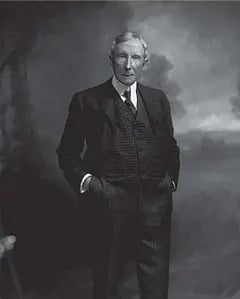"John D. Rockefeller: Oil Tycoon, Philanthropist & Richest Man in History"
"Discover John D. Rockefeller’s journey from clerk to billionaire. Learn how Standard Oil monopolized industries and his legacy of groundbreaking philanthropy. Read more."


Introduction: The Man Who Defined the Gilded Age
The late 19th century, known as the Gilded Age, was an era of explosive industrial growth, stark inequality, and larger-than-life tycoons. At its helm stood John D. Rockefeller (1839–1937), a man whose name became synonymous with wealth, power, and innovation. Controlling 90% of America’s oil through Standard Oil, Rockefeller amassed a fortune worth over $400 billion in today’s dollars—a record unmatched even by modern billionaires like Elon Musk or Jeff Bezos. But beyond the staggering wealth lay a complex legacy: Was he a ruthless monopolist or a visionary philanthropist? In this exhaustive blog, we dissect Rockefeller’s strategies, scandals, and societal impact. click here to see history of money.
Early Life: The Making of a Mogul
Humble Beginnings and Moral Foundations
Born in Richford, New York, to a traveling snake-oil salesman (William Avery Rockefeller) and a devout Baptist mother (Eliza Davison), young John learned frugality and discipline early. His father’s shady dealings and absence forced him to become the family’s breadwinner at 16, working as a bookkeeper in Cleveland.
Key Influences:
Religious Upbringing: His mother’s Baptist teachings instilled a belief that wealth was a “God-given responsibility.”
Entrepreneurial Spirit: By 20, he co-founded his first business, Clark & Rockefeller, trading hay, grain, and meat.
The Oil Epiphany
In 1863, Rockefeller entered the booming oil industry, investing in a Cleveland refinery. Recognizing the chaos of unregulated drilling and refining, he envisioned a consolidated, efficient system—a vision that birthed Standard Oil in 1870.
Building the Standard Oil Empire: Tactics of a Titan
Monopoly Mastery: Horizontal and Vertical Integration
Rockefeller didn’t just dominate the oil industry—he redefined it.
Horizontal Expansion:
Predatory Pricing: Slashed oil prices below cost to bankrupt competitors, then bought them at bargain rates.
Secret Deals: Negotiated exclusive rebates with railroads (like the South Improvement Company) to undercut rivals’ shipping costs.
Vertical Control:
Owned pipelines, barrel factories, and delivery networks, cutting reliance on third parties.
By 1882, Standard Oil became America’s first trust, controlling 90% of U.S. refineries and pipelines.
Innovations That Transformed Industry
Cost Efficiency: Reduced refining waste from 60% to 4%.
Global Reach: Standard Oil kerosene lit lamps worldwide, from rural America to Asia.
Quality Standardization: Ensured consistent product quality, building consumer trust.
The Dark Side: Scandals and Public Backlash
“Robber Baron” Accusations
Critics like journalist Ida Tarbell (whose father was ruined by Rockefeller) exposed his cutthroat tactics in her 1904 exposé The History of the Standard Oil Company.
Notable Controversies:
The Cleveland Massacre: Rockefeller absorbed 22 of 26 rival refiners in Cleveland in six weeks (1872).
Anti-Trust Battles: The 1890 Sherman Antitrust Act targeted Standard Oil, culminating in its 1911 Supreme Court breakup into 34 companies (Exxon, Chevron, etc.). You can also make money like Rockefeller , By sharing knowledge use hostinger to buy domain and make 10k/month
The Hypocrisy of Philanthropy?
While donating millions, Rockefeller faced accusations of “tainted money”—using charity to whitewash his reputation. Labor unions condemned his donations to churches while Standard Oil workers endured low wages and dangerous conditions.
Philanthropy: Redefining Giving in America
Rockefeller’s post-1897 retirement marked a shift from accumulation to distribution, pioneering strategic philanthropy.
Transformative Contributions
Education:
Founded the University of Chicago (1890), a hub for research and free inquiry.
Funded Spelman College, empowering African American women.
Medicine:
Eradicated hookworm in the South via the Rockefeller Sanitary Commission.
Launched the Rockefeller Institute for Medical Research (now Rockefeller University), leading to breakthroughs in yellow fever and meningitis.
Global Impact:
The Rockefeller Foundation (1913) tackled global health crises, agricultural innovation, and arts funding.
Philosophy: “The best philanthropy is constantly in search of finalities—a search for cause, an attempt to cure evils at their source.”
Rockefeller’s Leadership Blueprint: Lessons for Modern Entrepreneurs
Relentless Efficiency: “Don’t be afraid to give up the good to go for the great.”
Long-Term Vision: Prioritized sustainable growth over quarterly profits.
Delegation: Built a loyal, skilled team, including Henry Flagler and John D. Archbold.
Adaptability: Shifted from oil to philanthropy, leaving a legacy beyond wealth.
The Rockefeller Dynasty: A Family’s Enduring Influence
John D. Rockefeller Jr.: Expanded philanthropy, building Rockefeller Center and donating land for the UN headquarters.
Nelson Rockefeller: Served as U.S. Vice President and New York Governor.
Modern Era: The family’s $11 billion fortune spans finance, real estate, and environmental causes.
FAQs: Unpacking Myths and Realities
Q1: Was Rockefeller richer than today’s billionaires?
A: Yes—his $400+ billion (adjusted) surpasses Musk’s and Bezos’ net worths.
Q2: Why did he hate competition?
A: He viewed competition as wasteful, believing consolidation improved efficiency and product quality.
Q3: How did his upbringing shape his ruthlessness?
A: His father’s scams and his mother’s piety created a blend of sharp business acumen and moral guilt.
Q4: Did Rockefeller regret his monopolistic practices?
A: In his memoir, he defended Standard Oil but admitted, “I would never have done it if I had to do it over again.”
Conclusion: The Paradox of Power
John D. Rockefeller remains an enigma—a man who built an empire on monopolistic tactics yet saved millions through philanthropy. His story mirrors the Gilded Age itself: a blend of ambition, innovation, and moral ambiguity. For entrepreneurs, his life offers timeless lessons in scaling enterprises, while his controversies remind us of the ethical tightropes of power.
